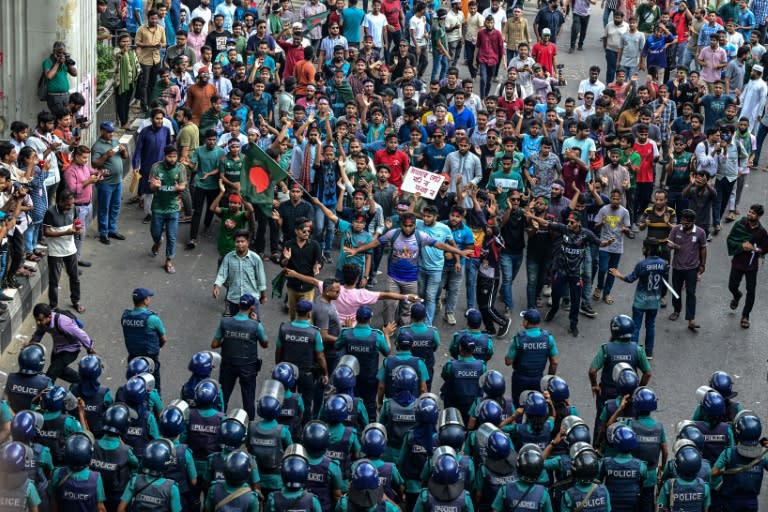Bangladesh suspends job quotas after student protests

Bangladesh's top court on Wednesday temporarily suspended quotas for coveted government jobs after thousands of students staged nationwide protests against what they call a discriminatory system, lawyers said.
The quota system reserves more than half of well-paid and massively over-subscribed civil service posts, totalling hundreds of thousands of government jobs, for specific groups including children of liberation heroes.
Students launched protests earlier this month, demanding a merit-based system, with demonstrations on Wednesday blocking highways and railway lines.
"We will not return to classrooms until our demand is met," protest leader Rasel Ahmed of Chittagong University told AFP.
The quota system was abolished in 2018 after weeks of protests, but reinstated in June by Dhaka's High Court, sparking fury from students.
The Supreme Court on Wednesday suspended that order for a month, said lawyer Shah Monjurul Hoque, who represents two students seeking to end the quota system.
Hoque told AFP that Chief Justice Obaidul Hassan had also requested that students return to class.
Despite the call, student groups continued to block key highways and railway tracks, bringing traffic movement in much of the capital Dhaka and several major cities to a halt.
"This (court) order is temporary. We want a permanent executive order from the government, saying that the quotas are abolished, except some quotas for the disabled and minorities," said Parvez Mosharraf, a student at Dhaka University.
He was among dozens of students who laid timber logs on a railway track at Dhaka's Karwan Bazar, forcing the halt of train services connecting the capital to northern Bangladesh.
- 'Limited number of jobs' -
The quota system reserves 30 percent of government posts for children of those who fought to win Bangladeshi independence in 1971, 10 percent for women, and 10 percent for residents of specific districts.
Students said only those quotas supporting ethnic minorities and disabled people -- six percent of jobs -- should remain.
"We don't also want the job quotas for women because women are no longer lagging behind," female student Meena Rani Das, 22, told AFP.
"Women are marching ahead with their talents. But the quota system is creating obstacles and snatching our rights."
Critics say the system benefits children of pro-government groups, who back Prime Minister Sheikh Hasina.
Her father, Sheikh Mujibur Rahman, was Bangladesh's founding leader.
Hasina, 76, won her fourth consecutive general election in January, in a vote without genuine opposition parties, with a widespread boycott and a major crackdown against her political opponents.
Critics accuse Bangladeshi courts of rubber-stamping decisions made by her government.
Hasina has condemned the protests, saying the matter had been settled by the court.
"Students are wasting their time," Hasina said Sunday, adding there was "no justification for the anti-quota movement".
Thousands of students on Wednesday threw up barricades across key intersections in Dhaka, as well as blocking major highways connecting the capital to other cities, police said.
Hemayetul Islam, deputy police chief in the northwestern city of Rajshahi said that "at least 200 students" blocked the highway to Dhaka.
"Brilliant students no longer get the jobs they want because of this quota system," said Halimatuz Sadia, a protester and physics student at Chittagong University.
"You work hard only to find out that there are only a limited number of jobs available," she added.
str-es-sa/gle/ssy


